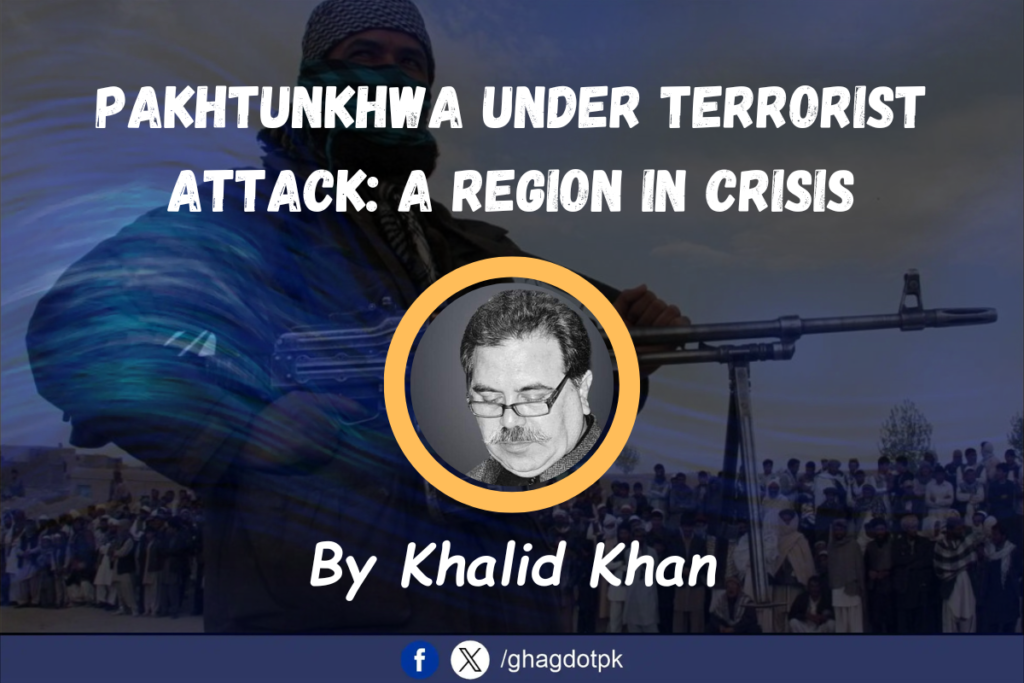By Khalid Khan
Khyber Pakhtunkhwa (KP), once a thriving gateway to Central Asia and home to a resilient people, is now under the severe threat of escalating terrorism. With the region’s security forces and citizens both targeted in brutal attacks, the situation has grown increasingly critical. The provincial government’s approach, however, appears detached, leaving the population feeling abandoned.
In recent weeks, attacks have spiked, with security forces, particularly in the crosshairs. Yet, the provincial government, under the leadership of Chief Minister Sardar Ali Amin Gandapur, has seemingly prioritized politics over peace. Instead of addressing the urgent security situation, the KP leadership has deflected blame onto the federal government. Observers criticize the KP government, led by Pakistan Tehreek-e-Insaf (PTI), for its limited response and question if its inaction signifies tacit support for militant activities. The recent APEX Committee meeting, chaired by the Chief Minister, renewed a vague commitment to eradicate terrorism but failed to produce concrete actions or a follow-up plan. Many see this as mere lip service rather than a meaningful commitment to protecting citizens.
The Shift to Crisis Mode
In the past year, KP, particularly its merged tribal districts, has seen a worrying increase in terrorist activities, disrupting the lives of residents and undermining security. The abrupt U.S. withdrawal from Afghanistan and the Taliban’s subsequent rise to power have further destabilized the region, with cross-border militancy on the rise. As a result, the people of Pakhtunkhwa are facing what feels like a return to the dark days of conflict that they had hoped were behind them.
Recent Wave of Attacks
Terrorist groups such as Tehrik-i-Taliban Pakistan (TTP) and affiliated organizations have intensified their operations, targeting southern districts, as well as North and South Waziristan, Swat, Bajaur, and the Peshawar division. Emboldened by Afghanistan’s changing political landscape, these groups have launched bold attacks, aimed at weakening the state’s security apparatus and sowing fear among civilians.
Everyday Life Disrupted
The resurgence of terrorism has had devastating effects on ordinary lives in KP. The impacts are broad, disrupting security, the economy, and even mental health across the region:
1. Constant Fear and Social Disruption: Once-bustling marketplaces, schools, and public spaces are now plagued by fear, as citizens worry about the next attack. Education has taken a major hit, with numerous schools closing down amid security concerns. Parents face the dilemma of keeping their children safe at home or risking their safety by sending them to school.
2. Economic Decline: KP’s economy is reeling from the resurgence of terrorism. The region’s once-lucrative tourism industry has collapsed as travelers avoid the area. Businesses in Peshawar and Swat are seeing reduced activity, and foreign investment is all but non-existent due to safety concerns, leading to rising unemployment and economic despair.
3. Psychological Toll: Prolonged exposure to violence has severely affected the mental health of residents, particularly young people. Anxiety, depression, and post-traumatic stress disorder (PTSD) are increasingly common, as families live with the constant fear of losing loved ones. The sense of hopelessness grows daily.
The Government’s Response and Public Frustration
While both provincial and federal governments have pledged to address the security crisis, many feel their responses have been inadequate. The people of KP, facing terrorism daily, feel ignored and marginalized. Military operations in past years temporarily weakened militant groups, but the lack of sustained counter-terrorism policies and socio-economic reforms has allowed militancy to regain strength.
Protests and peace rallies are becoming more common, as citizens demand real protection and accountability. The public’s frustration with government inaction is palpable, as is their call for a unified and decisive approach to curb terrorism.
Regional and International Factors
The KP security crisis is not merely a domestic issue; it is also deeply tied to regional and international dynamics. The porous border with Afghanistan and the presence of militant hideouts on both sides complicate efforts to ensure security. Changing geopolitical alignments and regional power struggles add to the instability, indirectly fueling extremism.
Tensions between Pakistan and Afghanistan over border management and alleged support for militants further exacerbate the situation. Meanwhile, reduced international involvement and foreign aid have deprived the region of development projects that might have addressed underlying socio-economic issues.
A Path Forward: Suggested Measures
1. Strengthening Law Enforcement: A robust, unified security policy is essential. Law enforcement agencies must be modernized, and coordination between civilian forces and the military should be enhanced to effectively counter terrorism.
2. Socio-Economic Development: Security measures alone are insufficient. Economic development, improved education, and job opportunities can help deter youth from joining extremist groups. Investments in healthcare, infrastructure, and skills training are essential to offering sustainable alternatives to militancy.
3. Community Engagement: Sustainable peace requires engaging local communities. Traditional leaders, tribal elders, and civil society organizations must be involved in discussions on security and development to ensure community-led, culturally sensitive strategies.
4. Regional Cooperation: Diplomatic efforts to strengthen collaboration with Afghanistan and neighboring countries should be prioritized. A cooperative approach to intelligence-sharing, border management, and counter-extremism measures can help address the cross-border aspects of militancy.
Conclusion
The rise in terrorist attacks across Khyber Pakhtunkhwa represents a formidable challenge that demands a comprehensive and multifaceted response. Beyond security operations, there is an urgent need for socio-economic reforms, mental health support, and community engagement to address the root causes of militancy.
The people of Pakhtunkhwa have shown resilience through decades of conflict, but they now deserve peace, stability, and the chance to rebuild their lives. Without a consistent, well-coordinated strategy, the region risks further destabilization, perpetuating a vicious cycle of violence that not only harms Pakistan but endangers the wider region.






